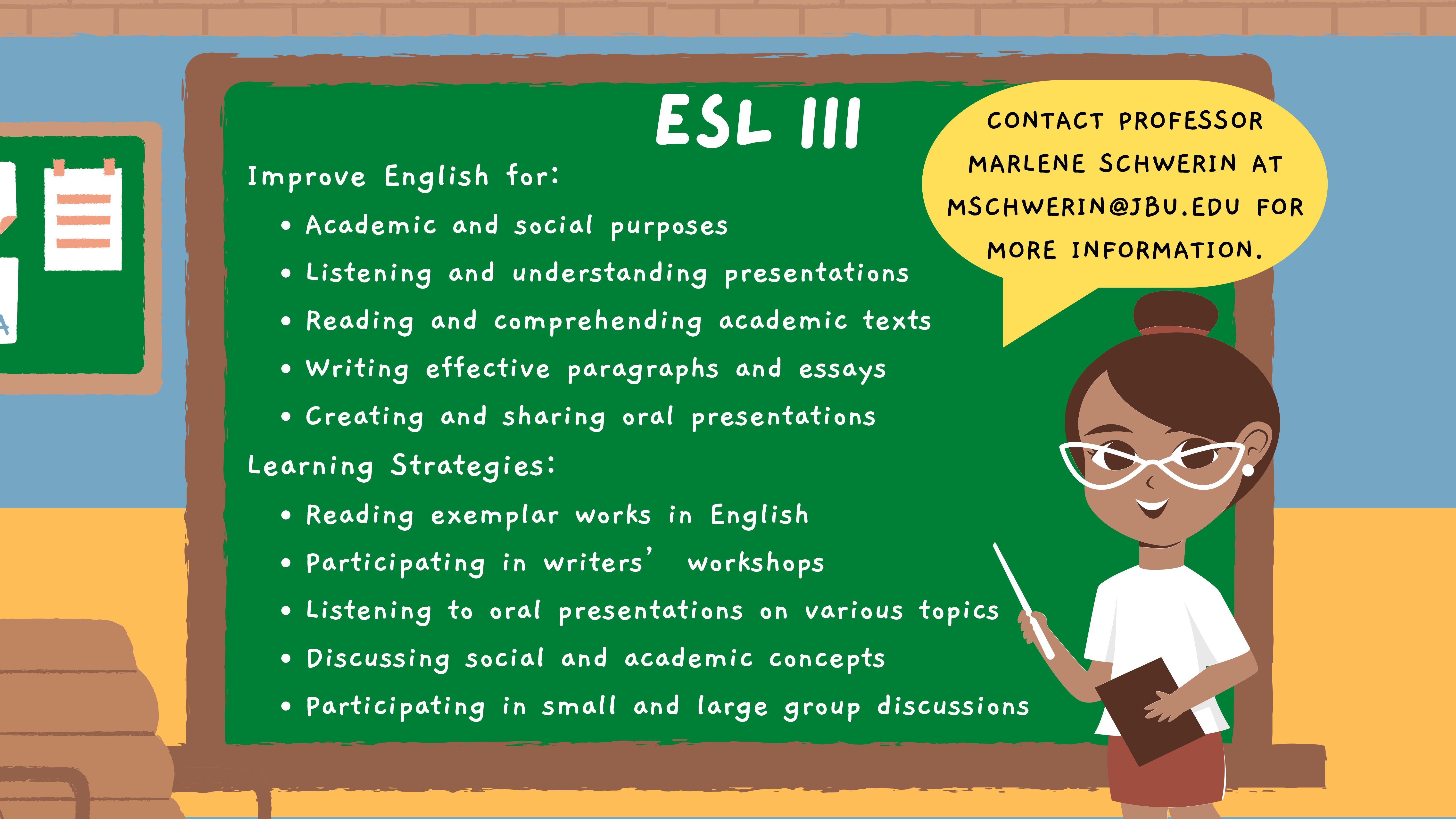![]()
Every year, John Brown University welcomes students from multiple cultures. In 2022, students enrolled at JBU from 36 states and 38 foreign countries, according to the university’s website. For some foreign students, coming to JBU comes with the additional challenge of attending classes in their non-native language. To help these students transition into their classes and academic language, JBU offers several English as a Second Language (ESL) courses.
ESL classes are prerequisites for non-native English speakers who are deemed not ready for the English I course after taking a placement test. JBU currently offers three class levels. According to students who have taken ESL classes, the benefits of the class are noticeable inside and outside their classrooms. Alexandra Castillo, a freshman illustration student, said that despite starting to learn English at 8 years old back in her home country, El Salvador, she found immense guidance in her ESL classes. “It was a bit difficult for me during the first two weeks because it is not the same talking in English only twice a week than for example, listening to an art class with all the concepts taught in English,” Castillo said. “The ESL class has helped me remember topics and concepts I’m not used to using. I would use mostly basic and social English, and now I’m learning words that help me talk formally with all my professors,” she continued.
The class is also a suitable place for new students to socialize and feel part of a group that understands them. “Thanks to the class I’ve met awesome people; I made some of my friends there. We shared similar backgrounds, they’re also immigrants from other countries like Venezuela, and Puerto Rico. Also, they understand my English better than anyone because English is also their second language,” Castillo said.
Castillo sees the influence of the class in her personal life. “I’m a really shy and introverted person and the class has helped me be more friendly with people and encourage me to be like that in other classes,” she said. “Without this class, I’d probably be more lonely my first semester than I actually am. I would have been more scared to make friends. In my art classes, most of my assignments are individual. It’s you, your artwork and the teacher. But in ESL class you can actually work with other classmates, and you meet everyone,” she added.
Castillo credits professor Marlene Schwerin, who has been teaching ESL classes at JBU since 2020, for making the class environment one where she feels comfortable being herself. “Our teacher, Mrs. Schwerin explains concepts in a way that makes them sound easy. She’s always helping us with everything, and so I feel like I can be more myself than in other classes where I’m more afraid of making a mistake in English.”
Professor Schwerin also shared her perspective and discussed the impact that she has witnessed the course have on her students. “In class, we work through a variety of strategies. The goal is for the students to come out of the class being more fluent in their ability to read and comprehend English texts, to write using academic English, and to listen to presentations not only from the instructor in this class but other instructors,” Schwerin said. The course material includes exemplary texts, vocabulary, and a lot of visual aids that help communicate the language more effectively. “I want to create an environment where everyone feels safe and welcome to share and ask questions without feeling inhibited or too afraid to ask,” Schwerin said.
To create a welcoming environment in the classroom, Schwerin organizes her classes with a lot of presentations and pair discussions for students to get familiar with each other. “I begin with having students talk with things they’re familiar with. Introducing themselves. Bringing a visual aid or artifact to refer to when sharing about themselves, their cultures and what makes them unique. These help students find things they have in common or find interesting about each other,” she said. After a few weeks of social listening and speaking activities, the class adds passages reading and analysis of their context. From that, students start developing more academic vocabulary to start drafting essays. “I start small, with several weeks of just paragraph writing. And then, once we get closer to midterms, we start writing short essays and everything builds on the previous assignment to advance the students writing and create more challenging independent thinking as we progress through the class,” she continued.
Another benefit of JBU ESL classes is the typically smaller class size. Schwerin explained that “students get a lot of individualized attention” and it provides an opportunity for her to really get to know the students and spend a lot of extra individual time with each student.
Schwerin’s class structure has successfully helped her not only polish her student’s skills but create meaningful connections with them even after the course is finished. “A lot of students have stayed in touch through email, or say ‘hi’ to me when we run into each other on campus. I also invite students over for dinner to my house both from my current classes and prior semesters. Most of them always come,” she said. Some students have also reached out for job or internship references.
Despite the benefits ESL courses have, many of these students that would benefit from them do not register for the class. According to Schwerin, the problem is that most of these students never even knew the class was offered. “Once I found out about them, I encourage them to take the class, but it would be so great if they just knew about it to start with before they’re struggling in other classes,” Schwerin said.
Schwerin said about the class: “if writing is not your forte in your native language or if you do like to write but you feel like you’re still learning how to develop academic writing, or you’ll like to more know about the culture that comes with the English writing, this may be a class for you.”
Gabriela Arosemena





